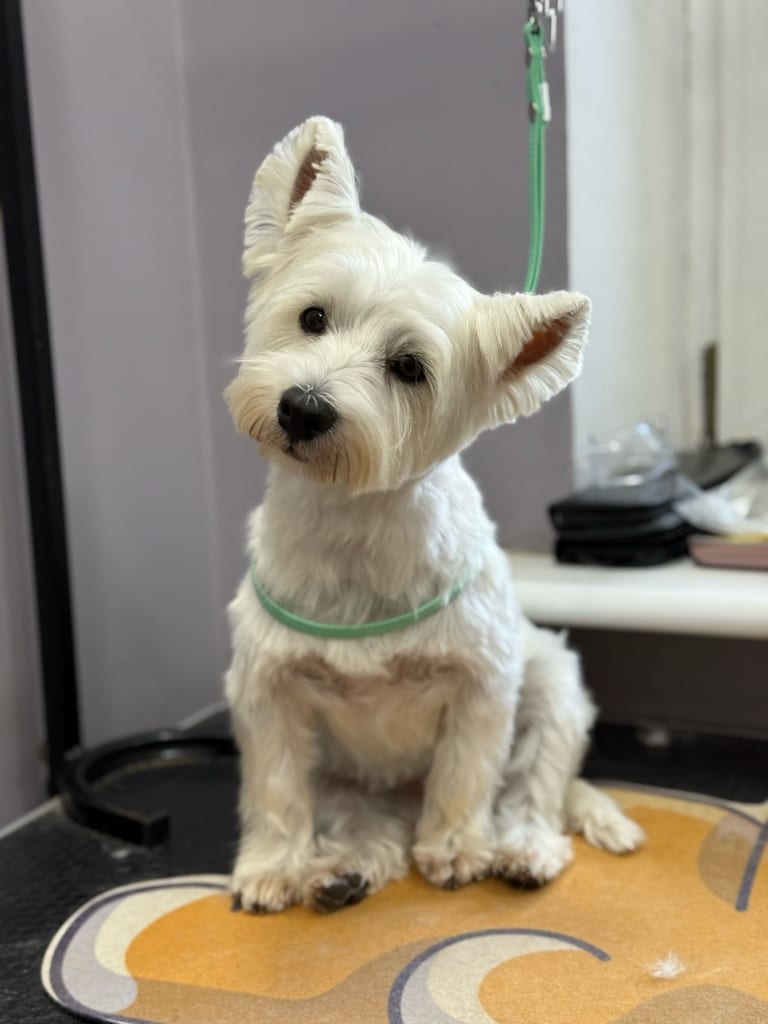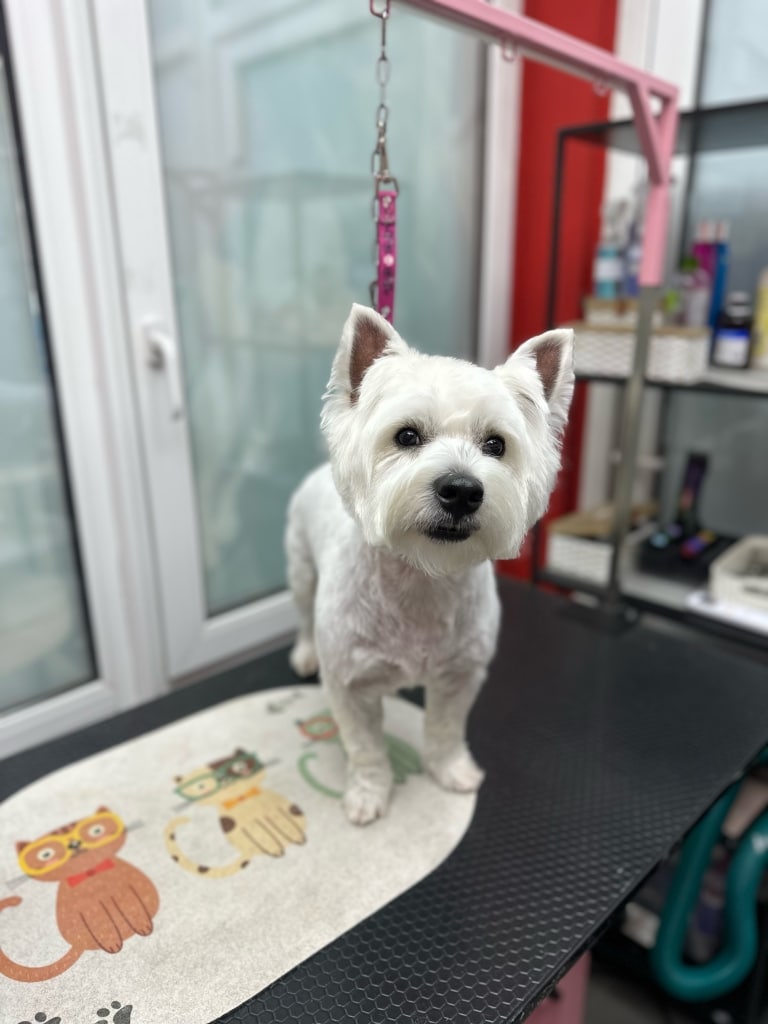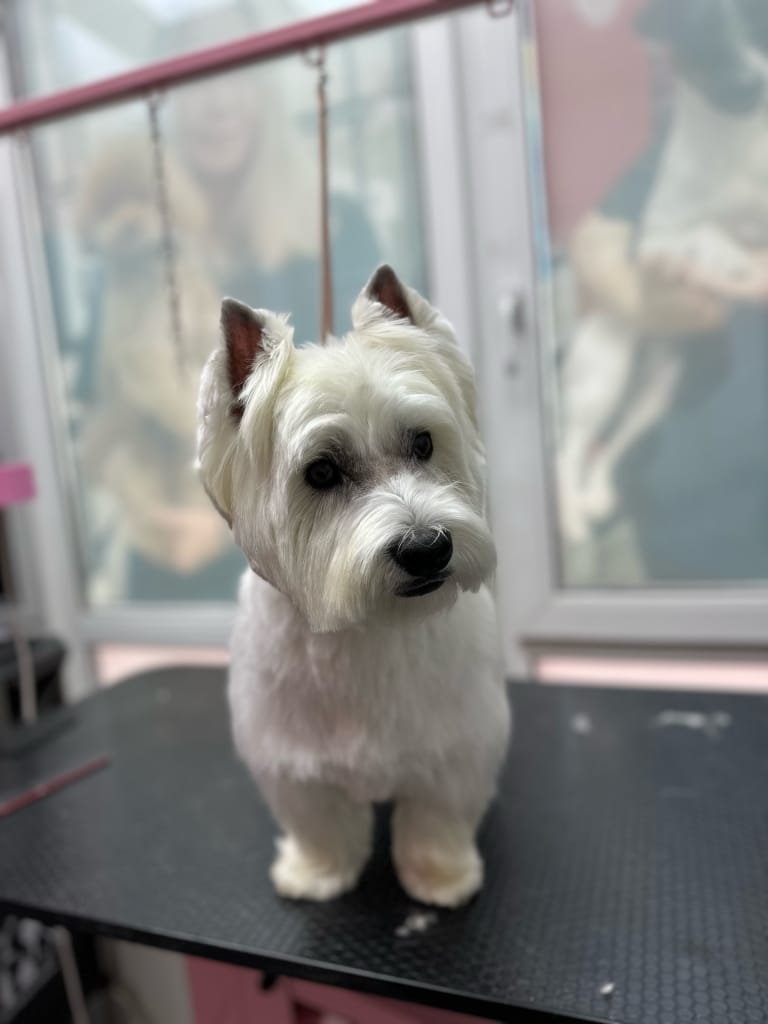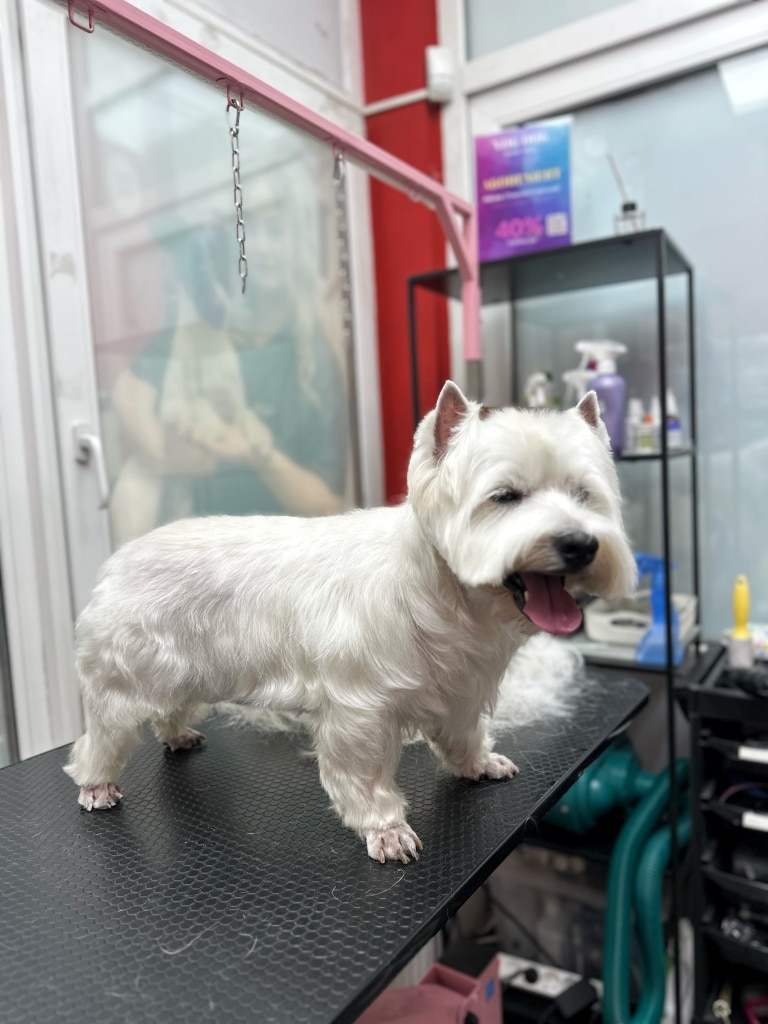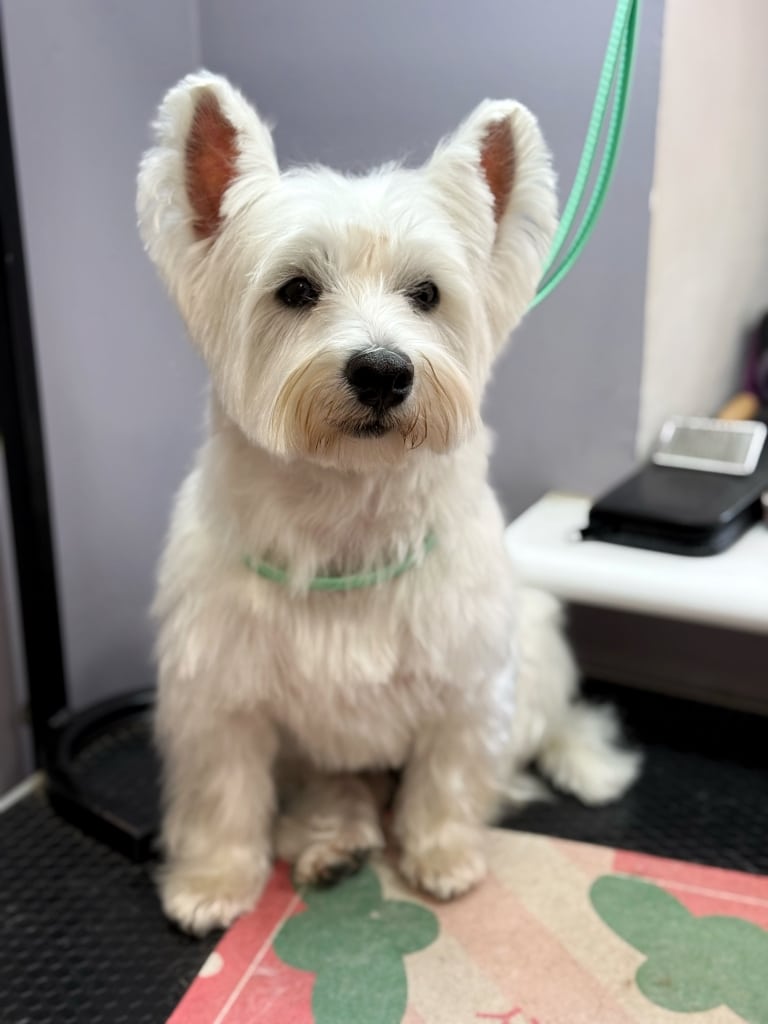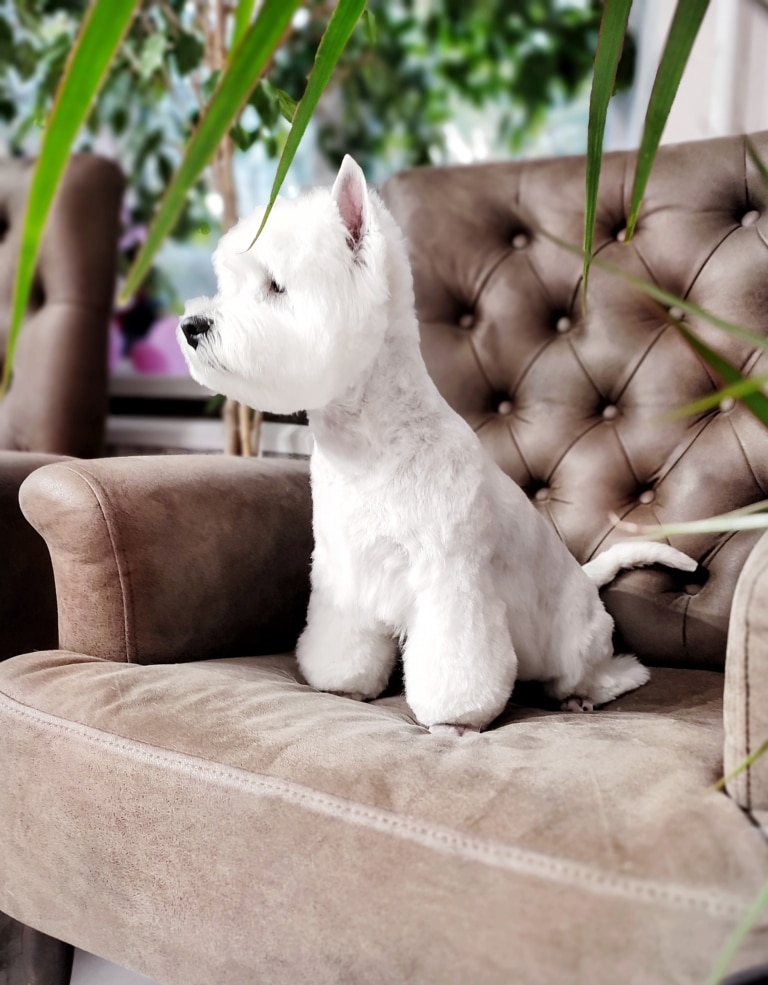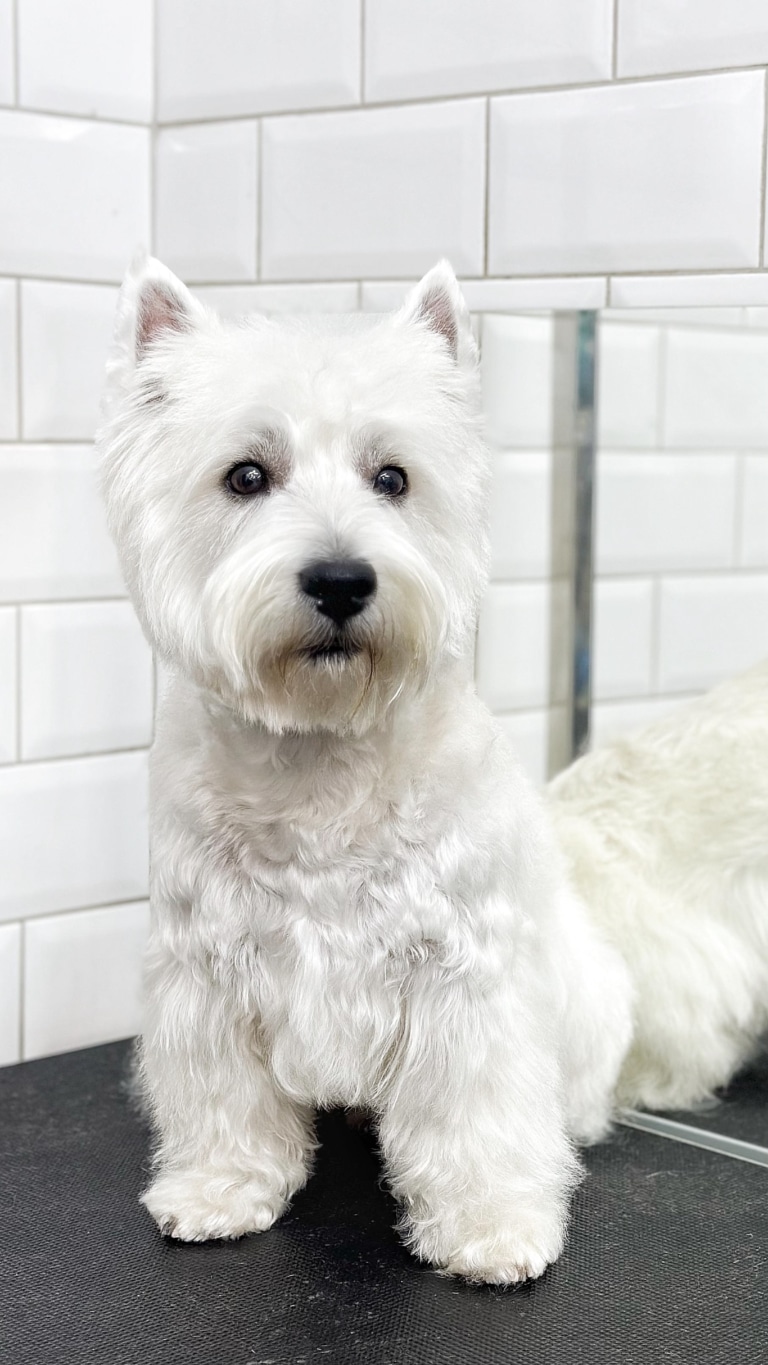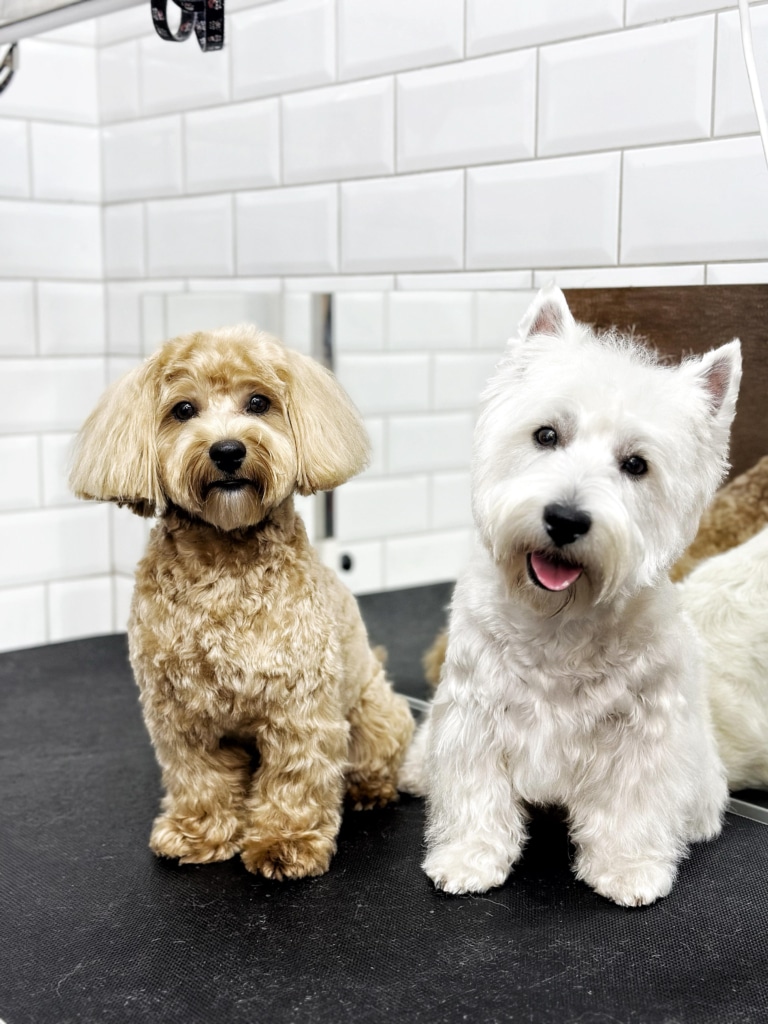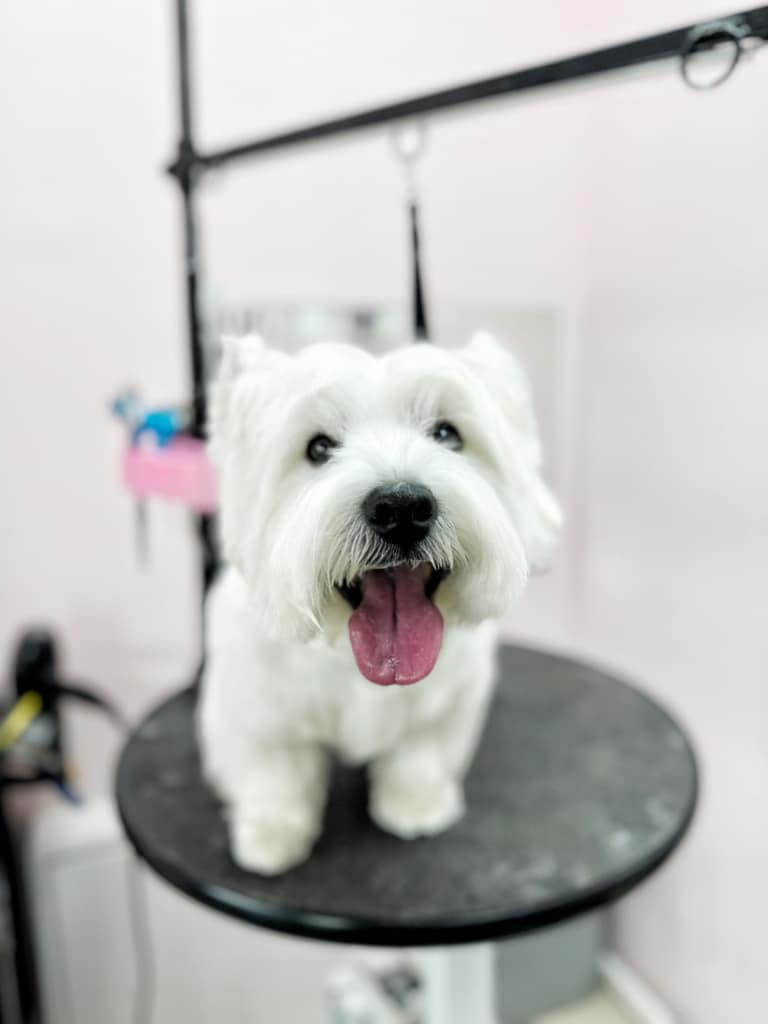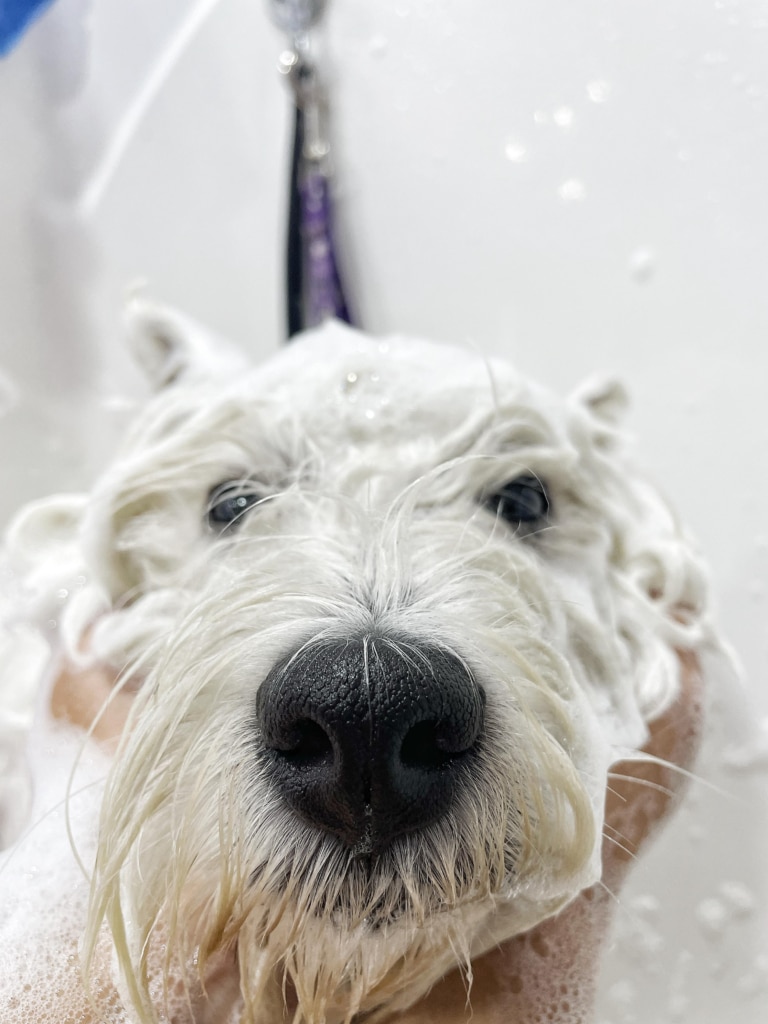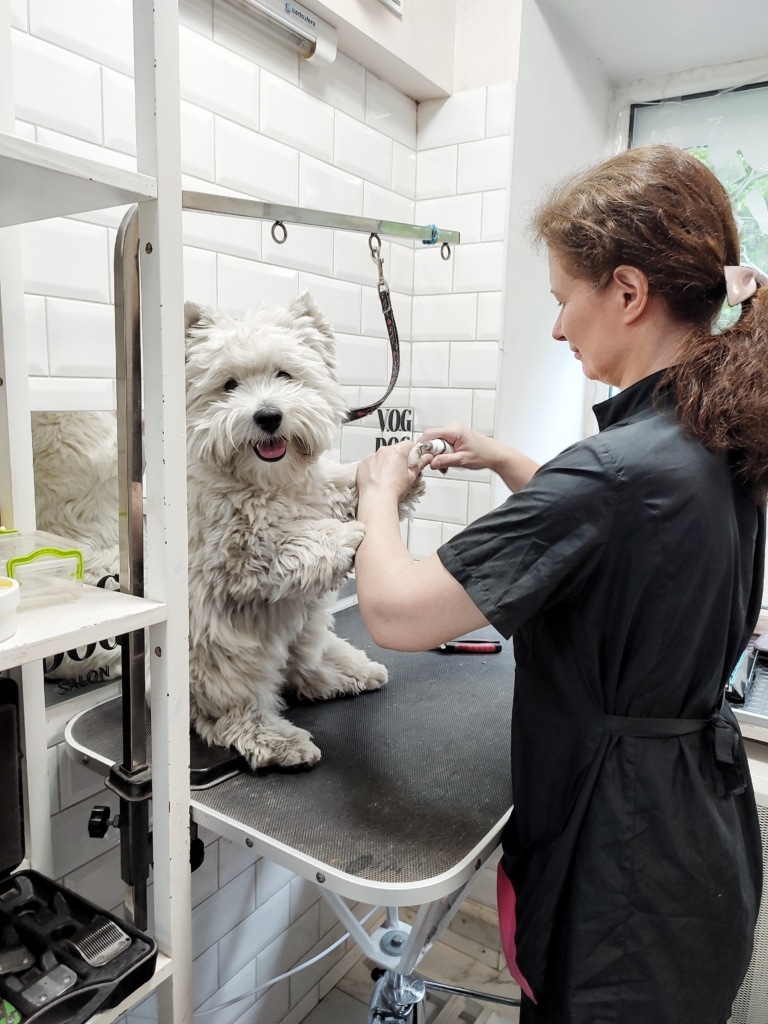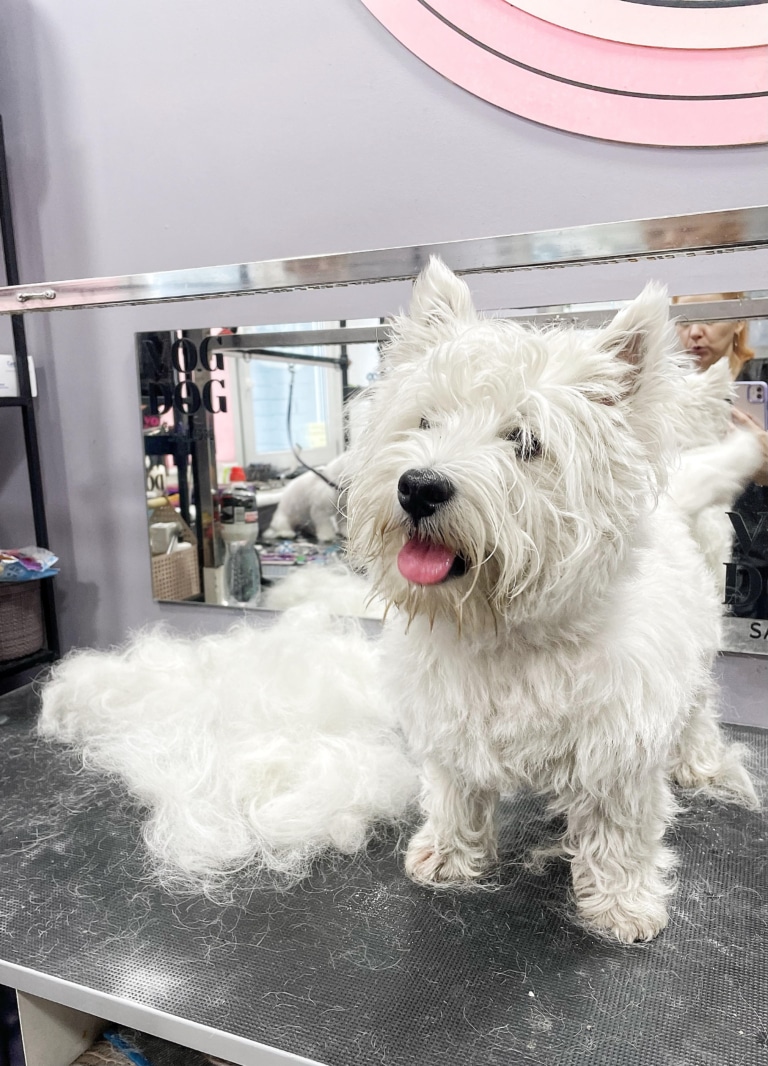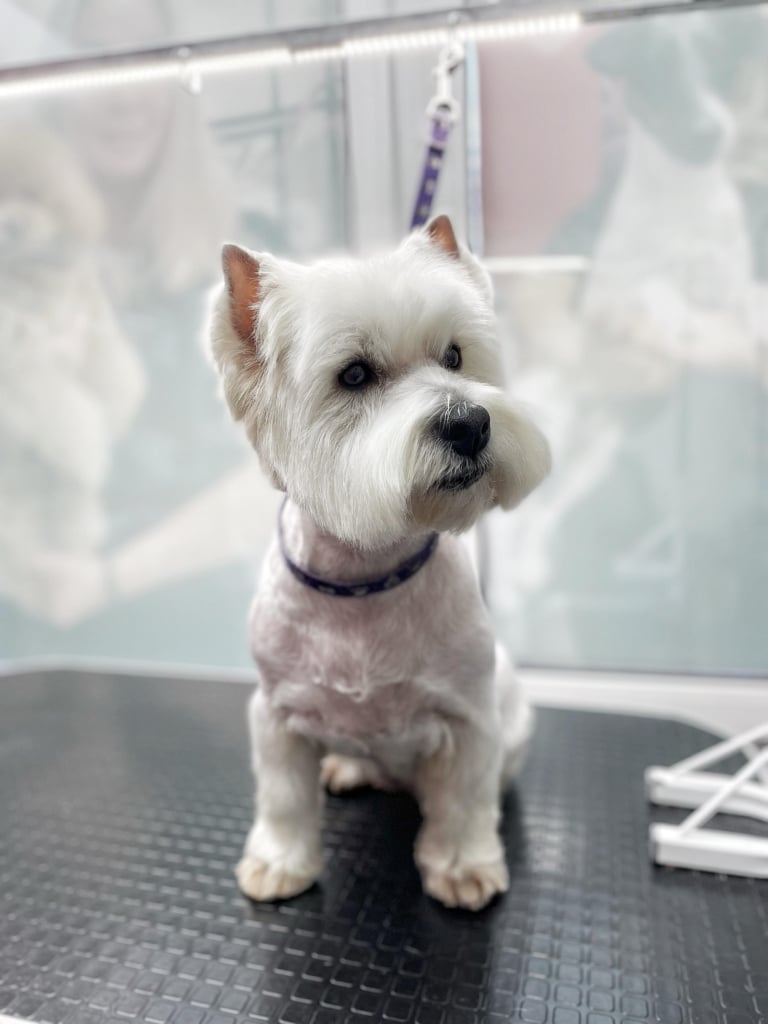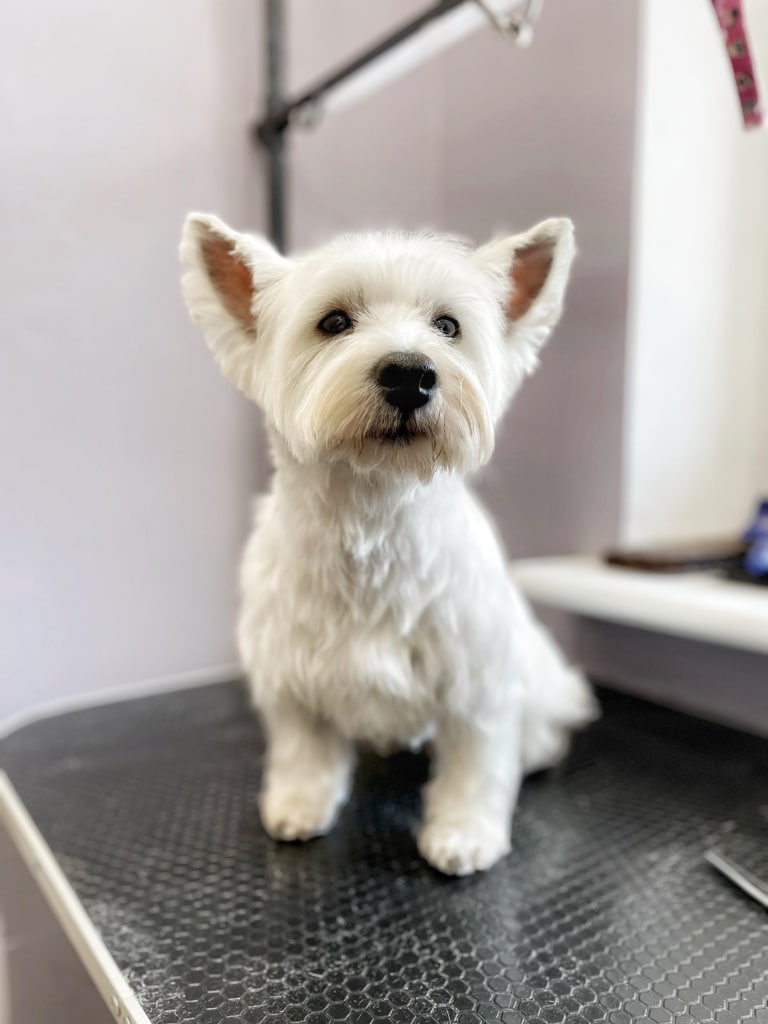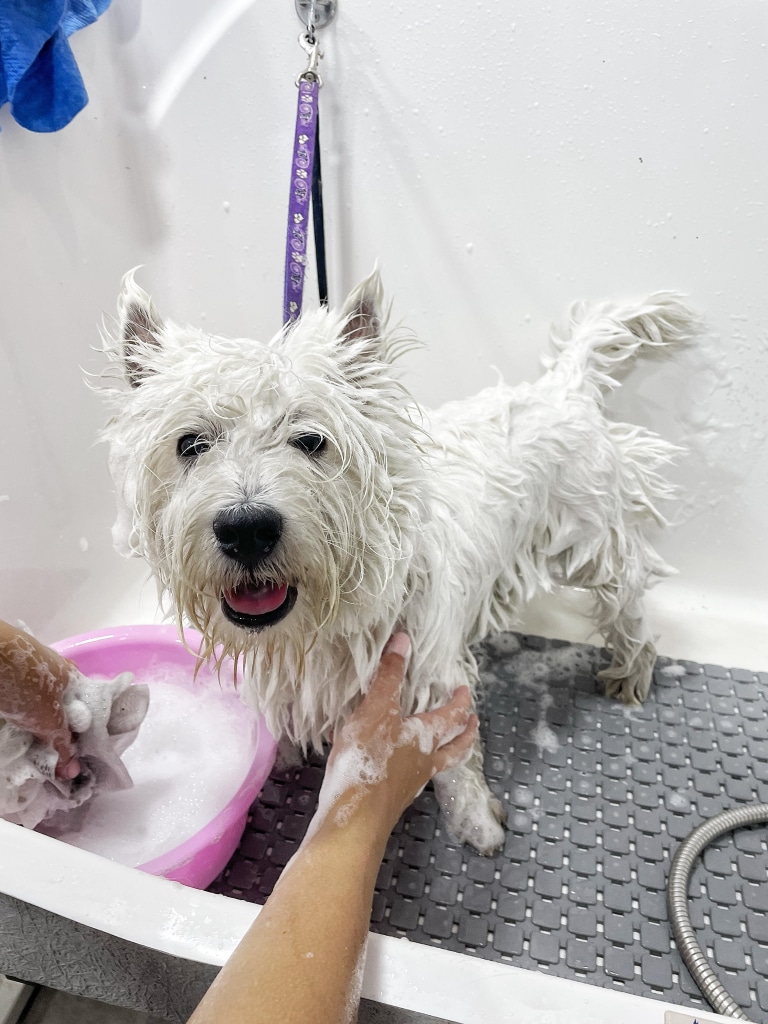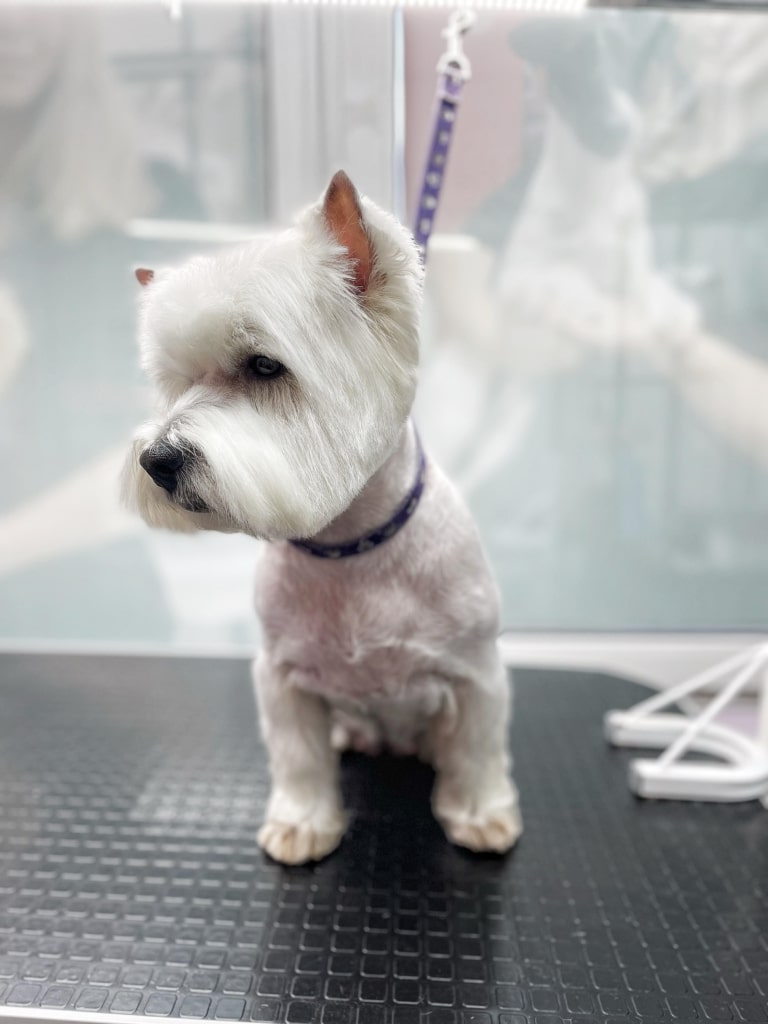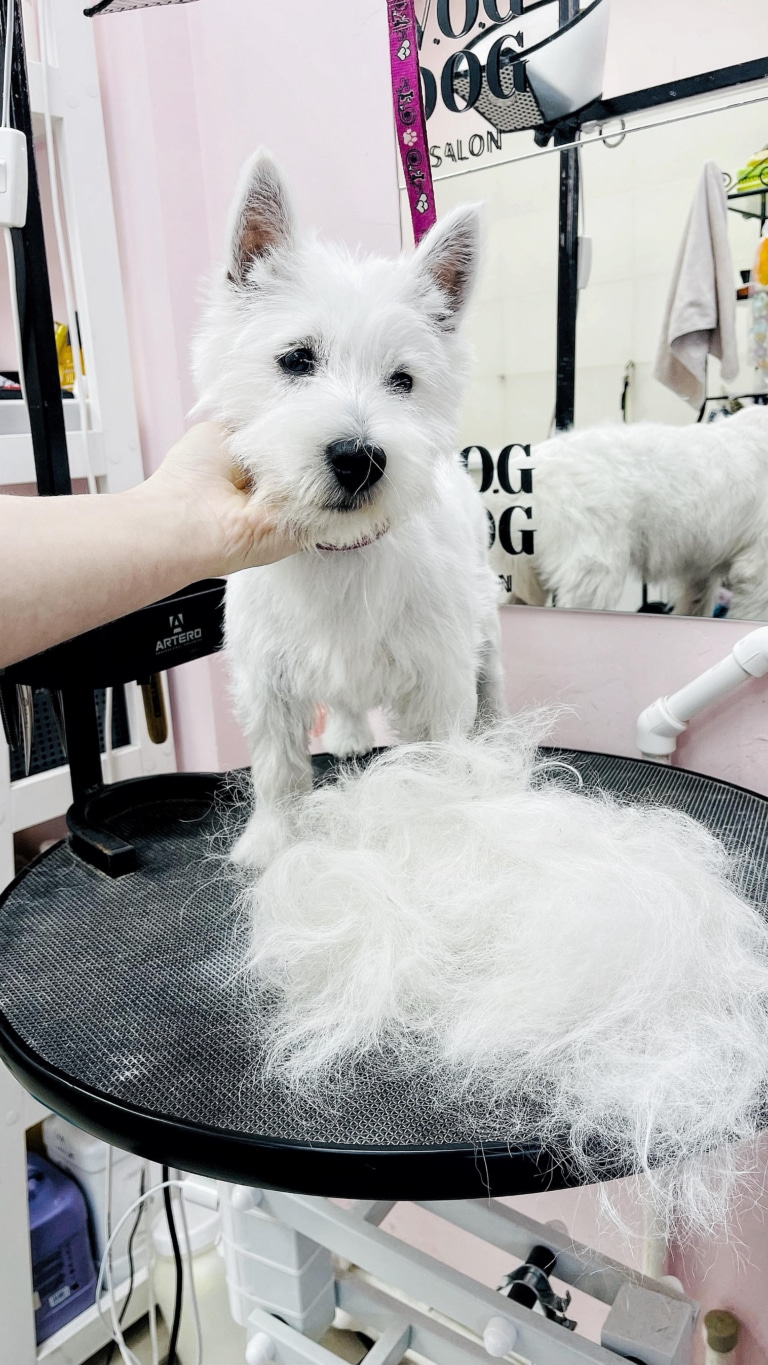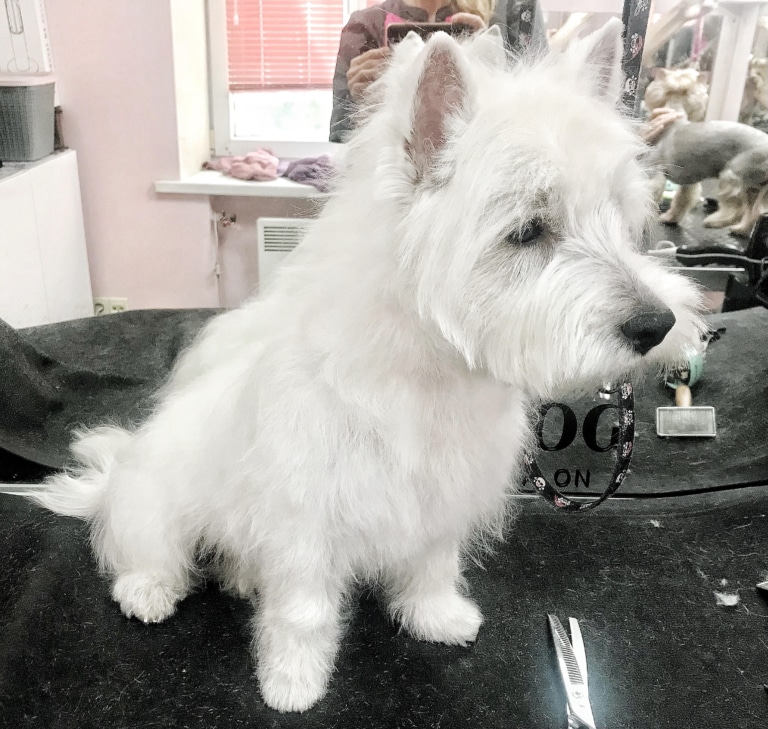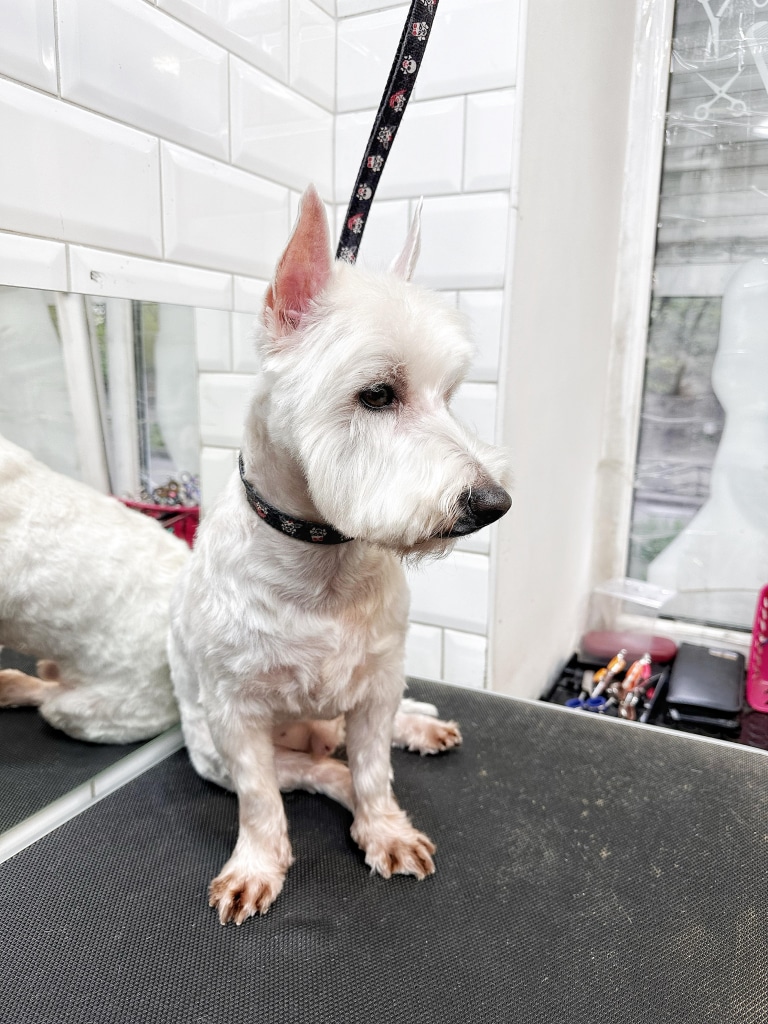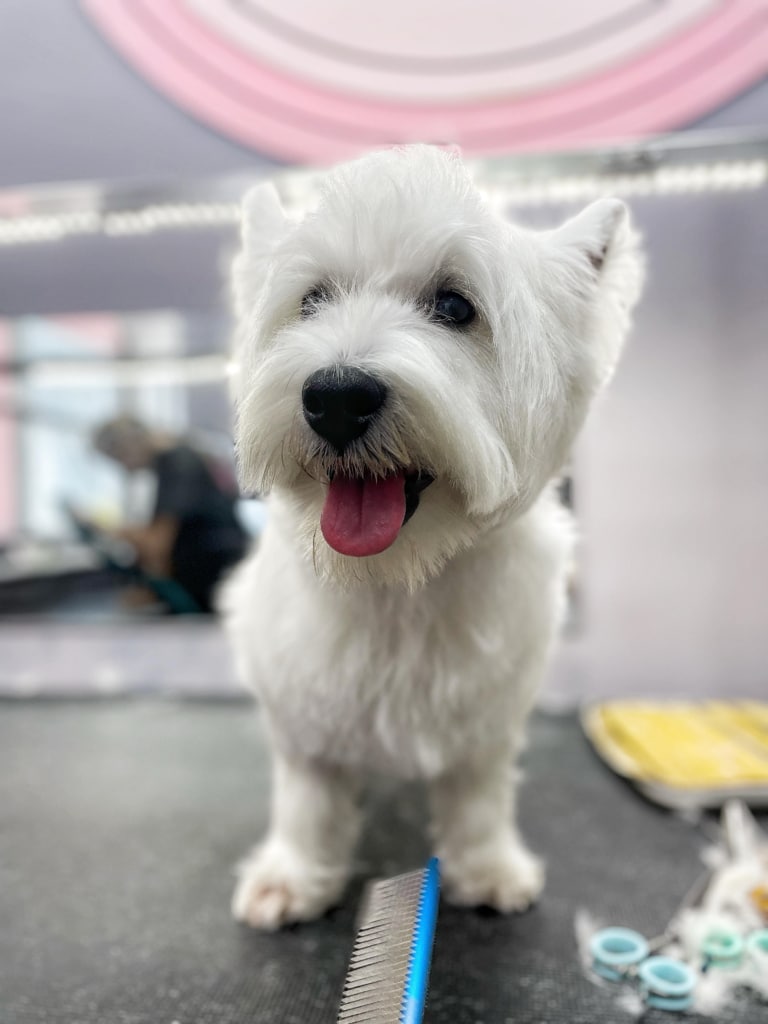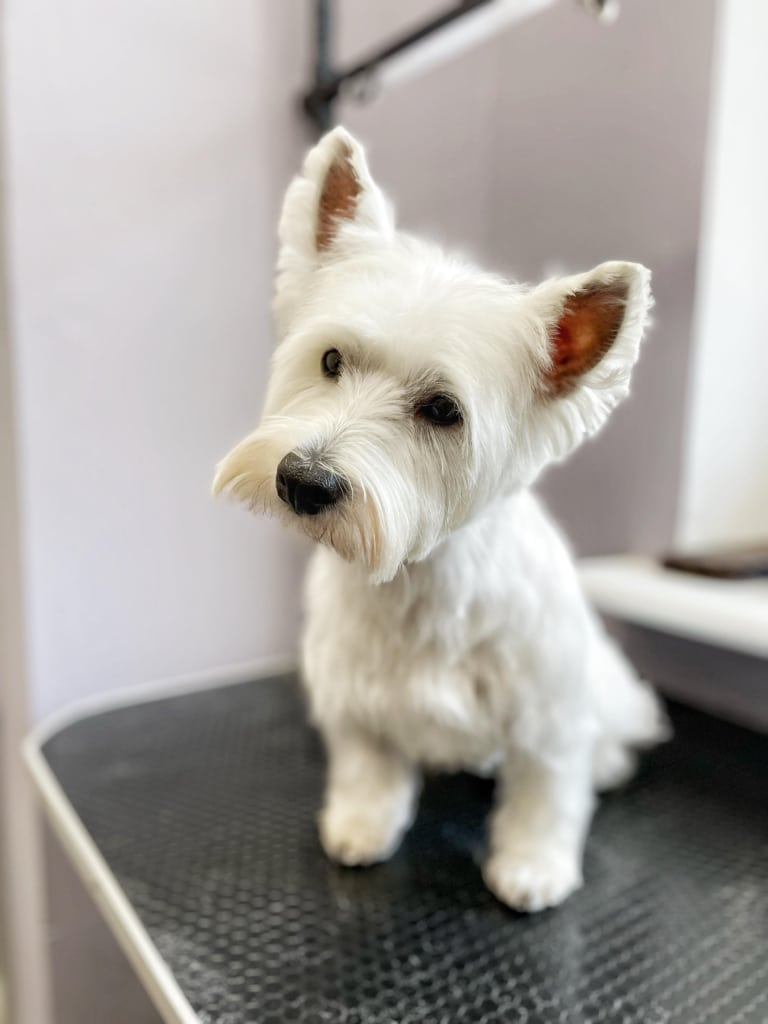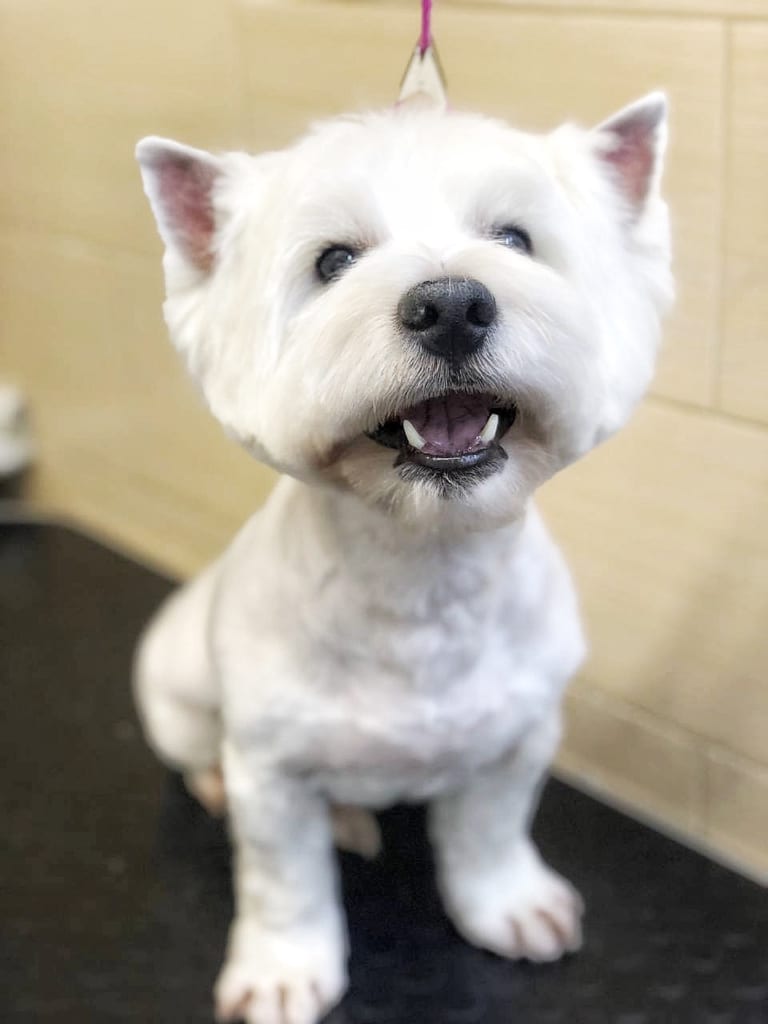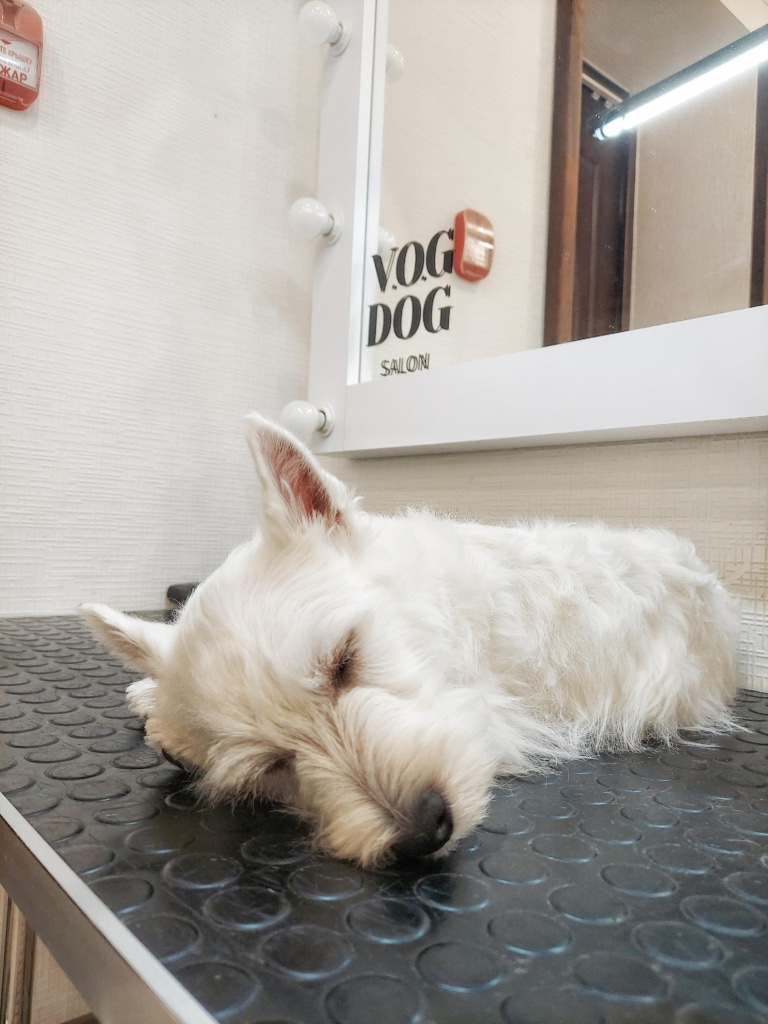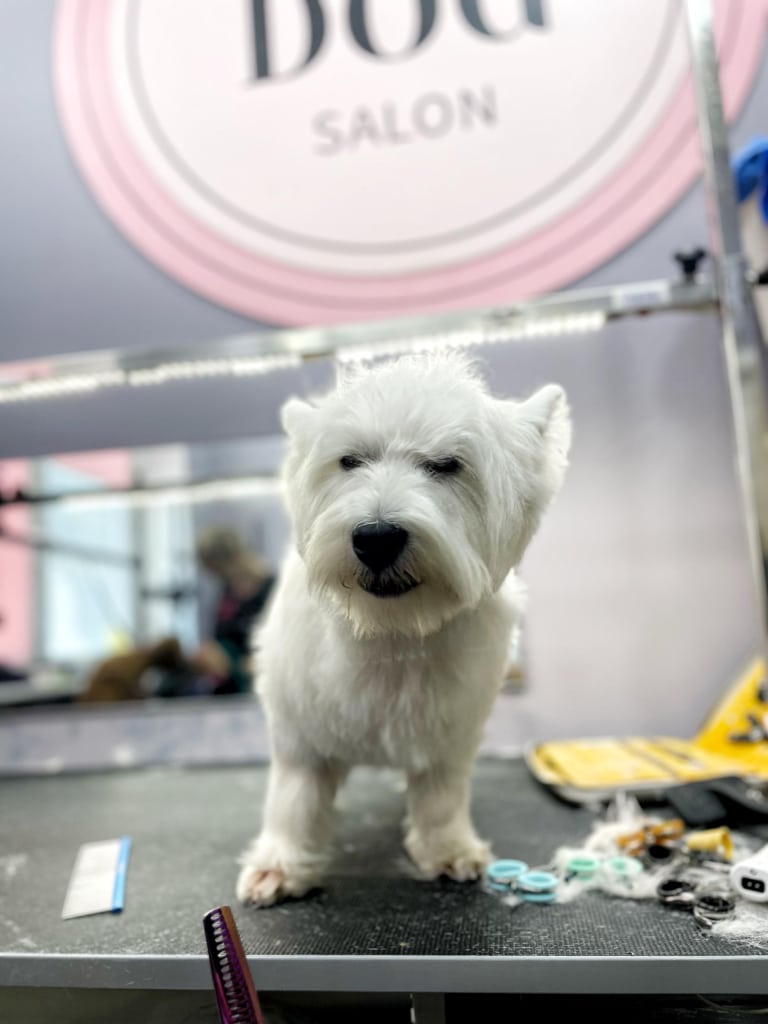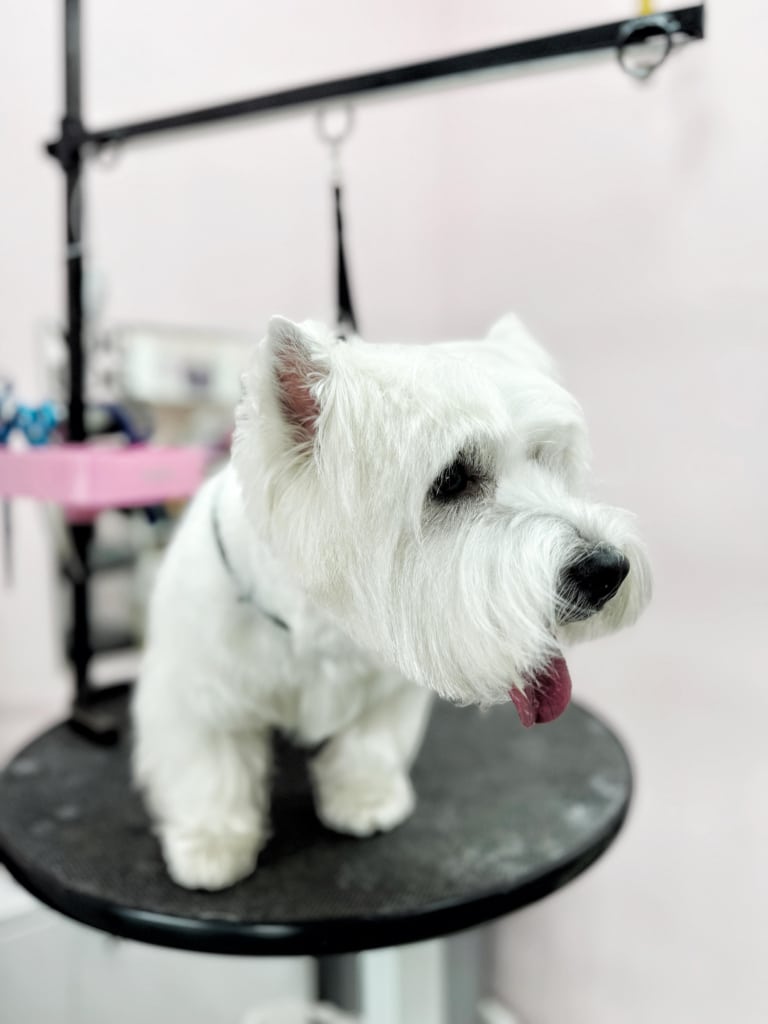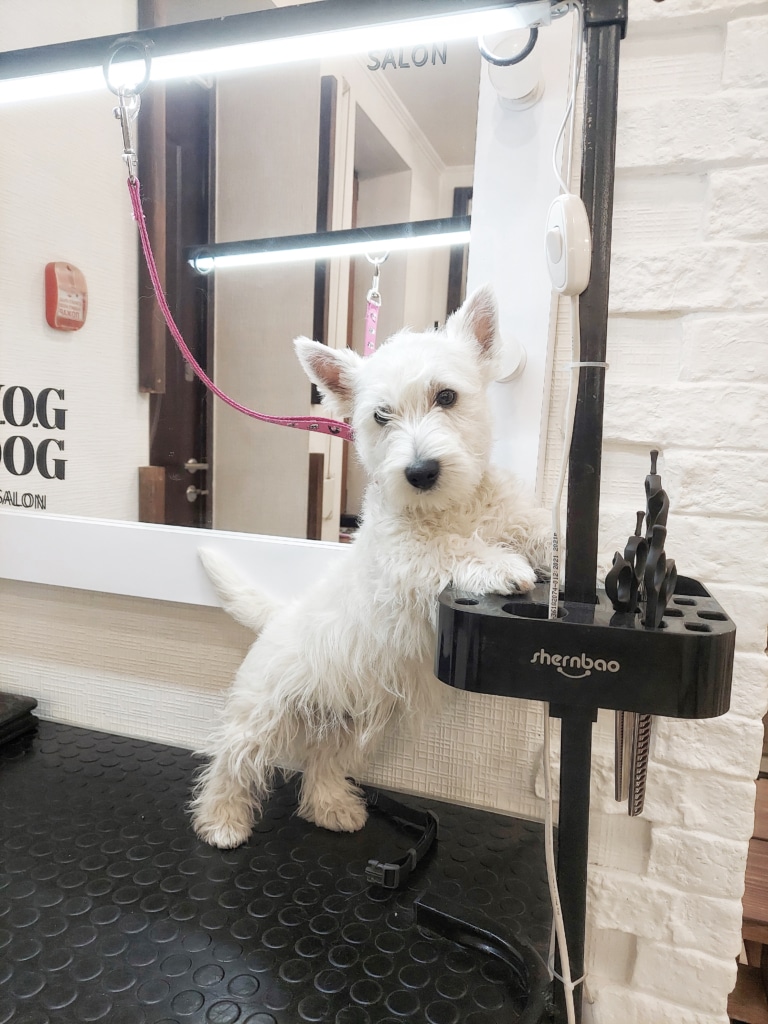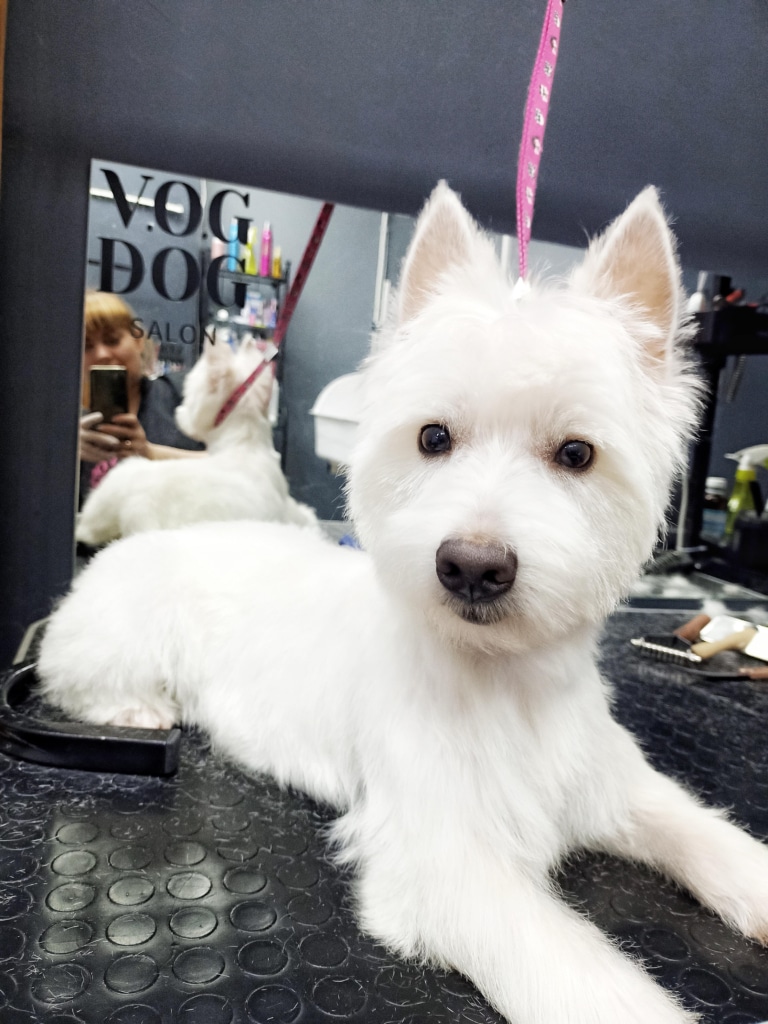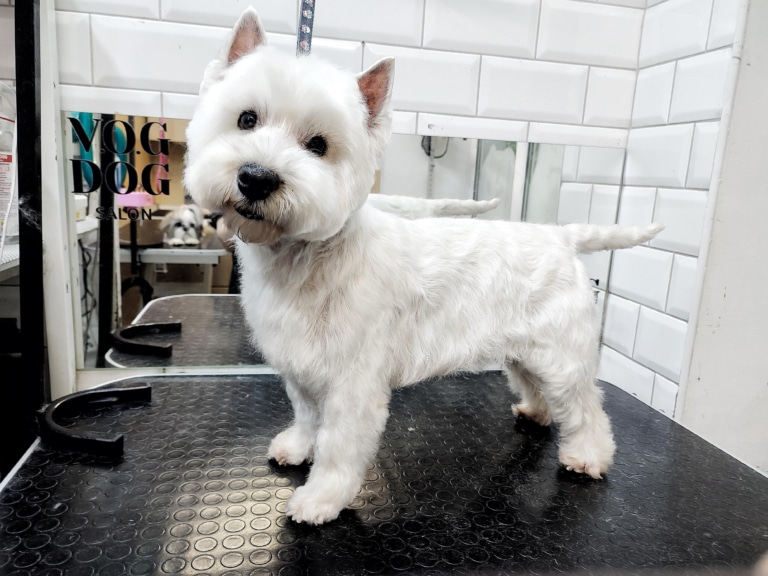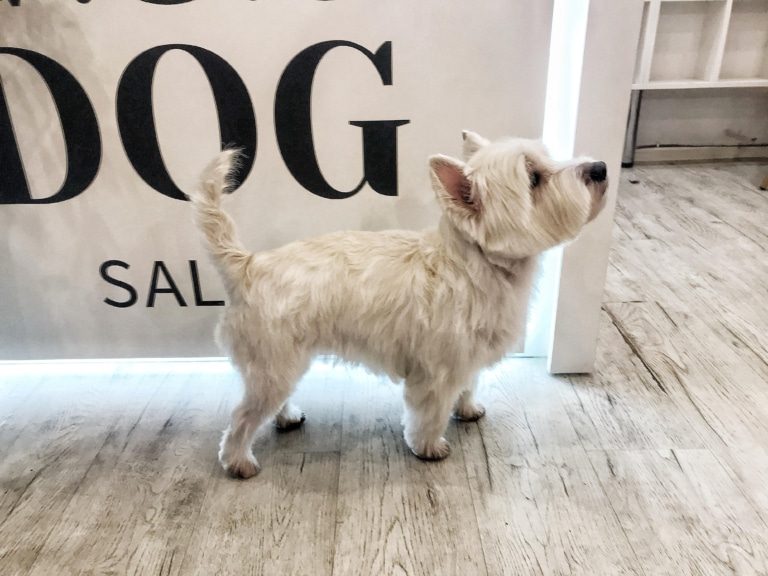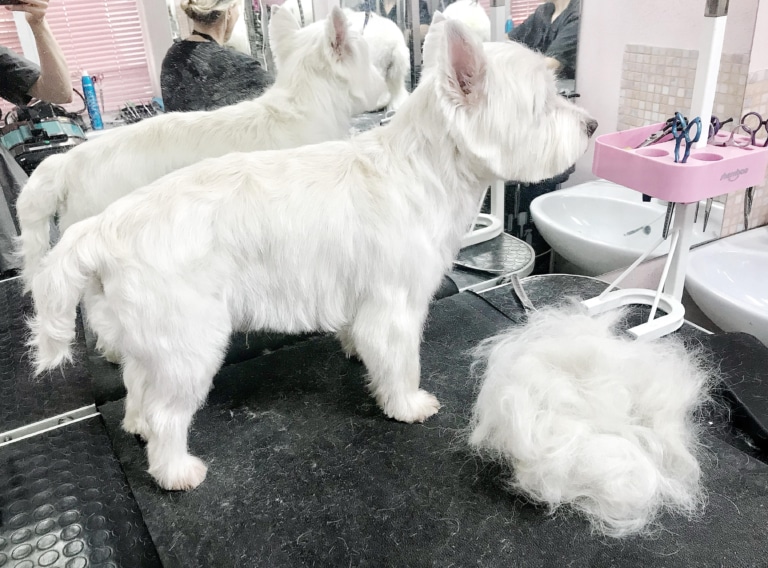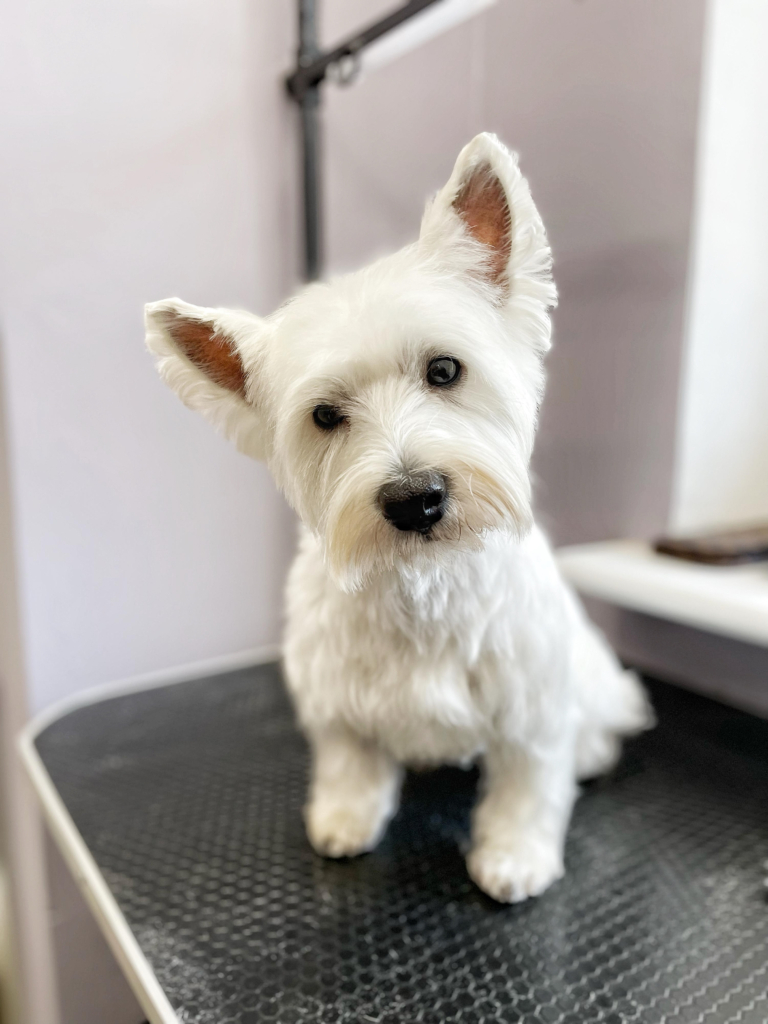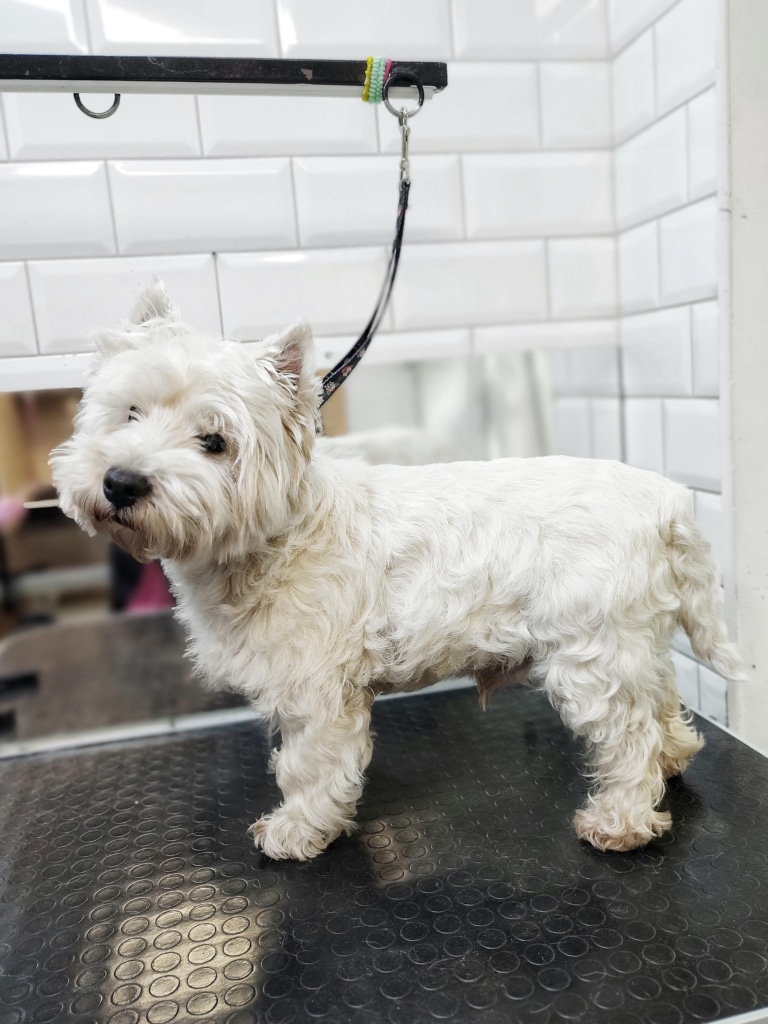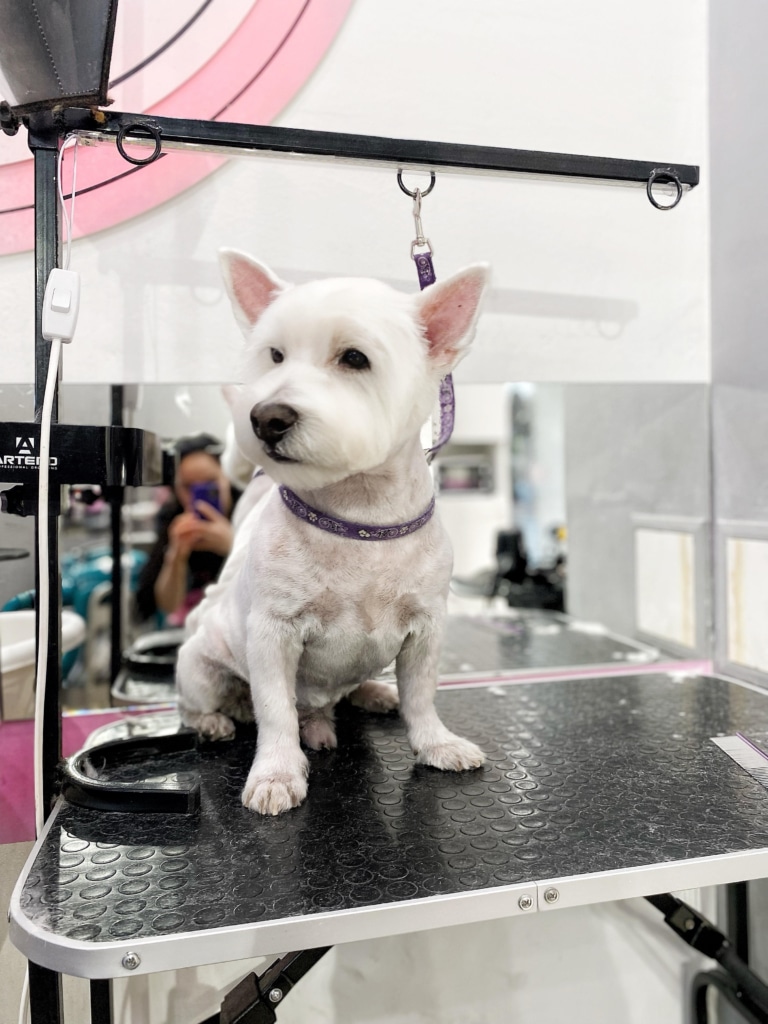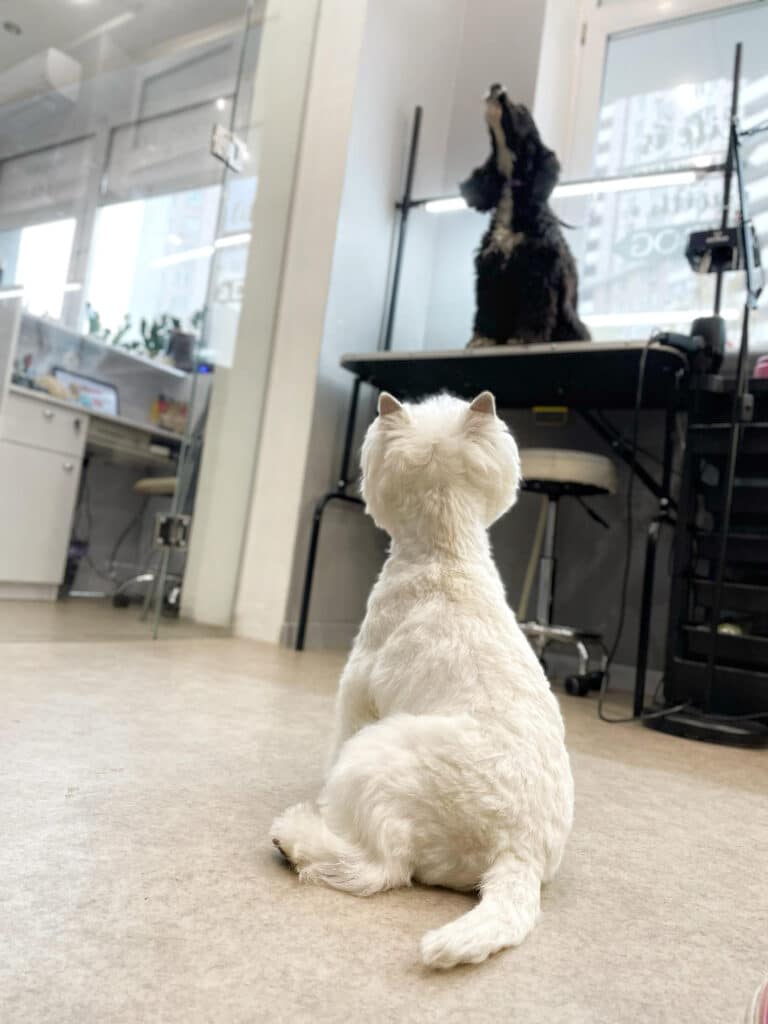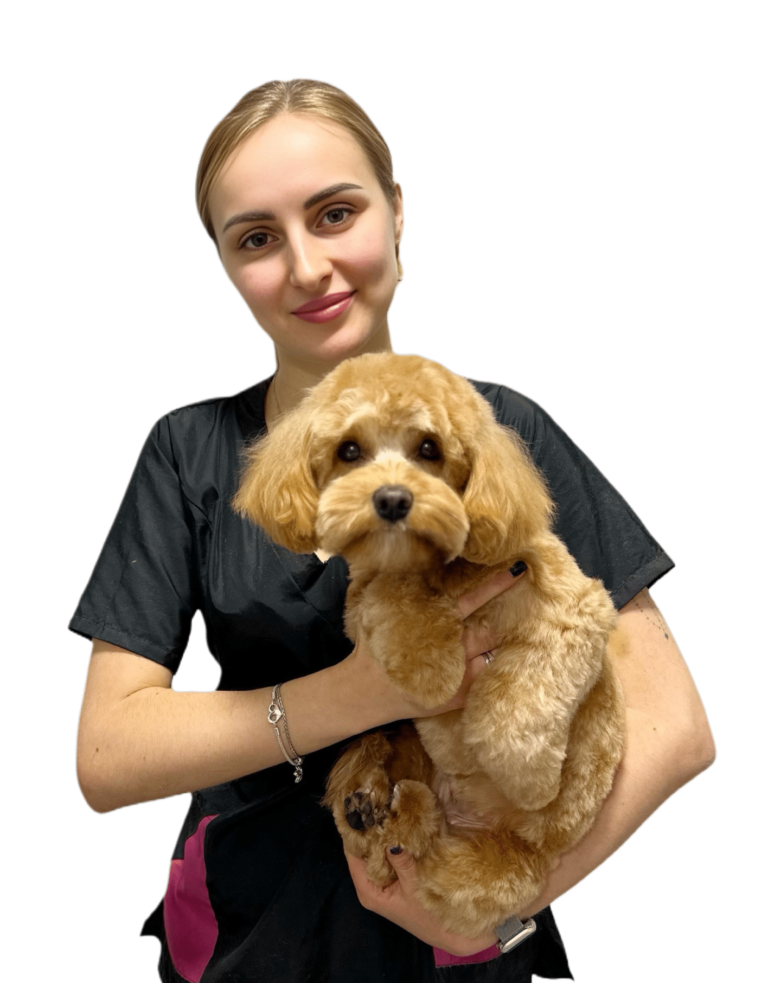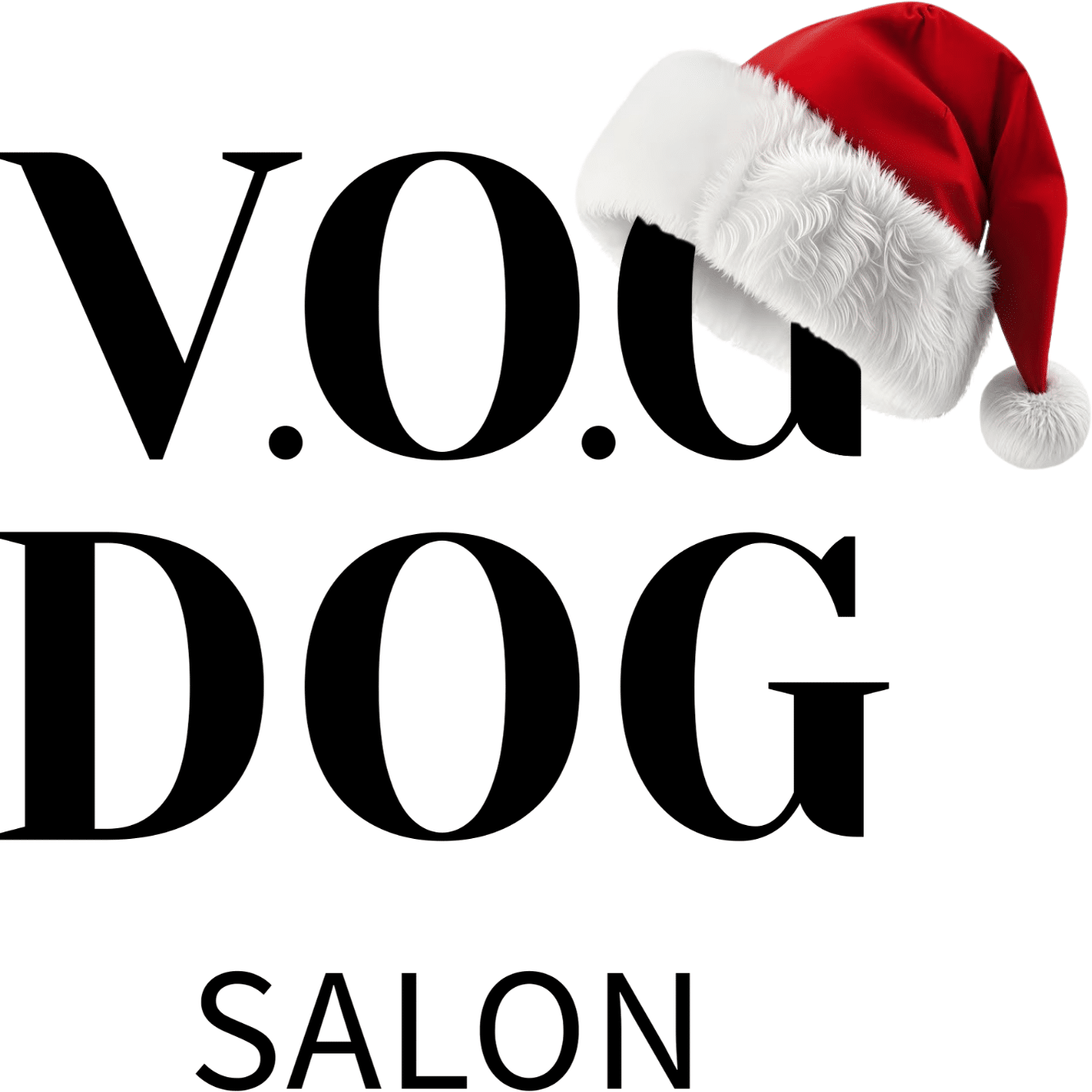
Description of the breed
The West Highland White Terrier, or Westie, is a small but surprisingly lively breed that originated in the highlands of Scotland. These dogs are distinguished by their snow-white, hard coat, which gives them a special appeal. Vesti are famous for their activity, curiosity and self-confidence. They are great for families with children and are always ready for new adventures, making them ideal friends for those who lead an active lifestyle.
The needs of the West Highland White Terrier
To maintain the health and good appearance of West Highland White Terriers, it is important to provide them with proper care. The basis of care is regular trimming, which allows you to maintain the natural hardness of the coat and the health of the skin. In addition, the coat should be regularly combed, the ears and eyes should be cleaned, and the claws should be trimmed. It is also important to pay attention to physical activity and a properly balanced diet, so that the news remains active and healthy. Visiting a professional groomer will help ensure proper care and meet all the needs of this breed.
7 reasons to groom a West Highland White Terrier in our pet beauty network
Our groomers are well acquainted with the peculiarities of the breed, so each vest receives a unique approach that takes into account its physiological and behavioral characteristics.
We use only the best grooming equipment that allows you to achieve the perfect result without harming your pet's fur and skin.
Our groomers master the art of hand stripping, which is the most recommended method of caring for the coat of the West Highland White Terrier. This ensures proper hair growth and preserves its natural appearance and structure.
We pay special attention to the comfort of the procedure for your pet, using techniques that reduce stress and ensure maximum comfort during grooming.
Our experts are ready to provide you with comprehensive recommendations for caring for the coat and skin of the West Highland White Terrier at home, which will help keep it in excellent condition between visits to the salon.
Our groomers have extensive experience working with different types of West Highland White Terriers, which allows us to provide the most accurate and appropriate care for each dog.
We pay attention to the condition of the skin and coat during each visit, which allows us to detect and prevent possible problems in the early stages, preserving the health of your pet.
Video of West Highland White Terriers from the V.O.G DOG SALON grooming salon network
Procedures are necessary for the health and beauty of the West Highland White Terrier
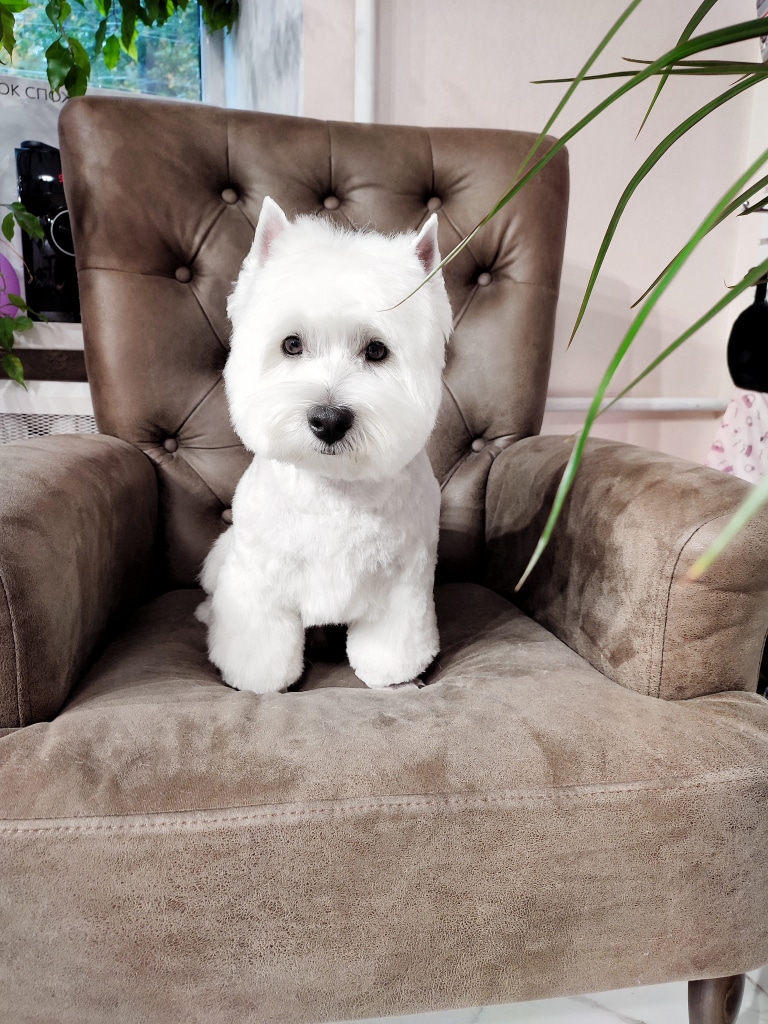
— Regular trimming to maintain a healthy coat:
Stripping is a key procedure for maintaining the natural stiffness of the West Highland White Terrier coat. Thanks to this method, old, dead hair is removed, which promotes healthy growth of new hair, preserves its natural shine and brightness of color. In addition, hand stripping helps prevent skin irritations and keeps the skin in a healthy state. This procedure should be carried out every 8-12 weeks to keep the coat in excellent condition.
— Thorough cleaning of the ears to prevent infections:
The ears of the West Highland White Terrier have a tendency to accumulate dirt and sulfur, which can lead to infections. Regular ear cleaning, including removing excess hair, helps keep them clean and healthy. This is important to prevent possible ear infections, which may not be noticeable in the early stages, but lead to serious problems in the future.
— Claw trimming for the comfort and health of paws:
Long claws can cause not only discomfort when walking, but also contribute to the deformation of paws and the development of arthritis in the future. Regular nail trimming prevents possible injuries. This procedure should be performed approximately once a month, depending on the speed of claw growth.
— Hygienic haircut to maintain cleanliness and comfort:
Grooming involves grooming the coat around the eyes, paws, under the tail, and other areas that may be prone to soiling or clumping.
— Regular bathing using special shampoos and conditioners:
West Highland White Terriers have a white, hard coat that needs special care to keep its bright color. The use of special shampoos and conditioners for hard wool allows you to maintain its cleanliness, softness and shine. In addition, regular bathing helps prevent skin problems and preserves the skin's natural protective layer.
— Professional dental care to prevent dental problems:
Dental health is an important component of the overall health of the West Highland White Terrier. Regular brushing of the teeth with the use of special pastes helps to avoid the formation of tartar, caries and inflammation of the gums. In addition, professional dental care includes plaque removal and a thorough examination of the oral cavity to prevent serious dental problems.
— Inspection and skin care to prevent allergies and dermatitis:
Vesti are prone to skin problems, such as allergies and dermatitis. Regular skin checks, including checking for irritation, rashes, or dryness, are essential to maintaining skin health. The use of special moisturizing agents and oils helps to maintain the natural balance of the skin, preventing the development of inflammatory processes and ensuring the comfort of your pet.
Frequently asked questions about caring for Vests
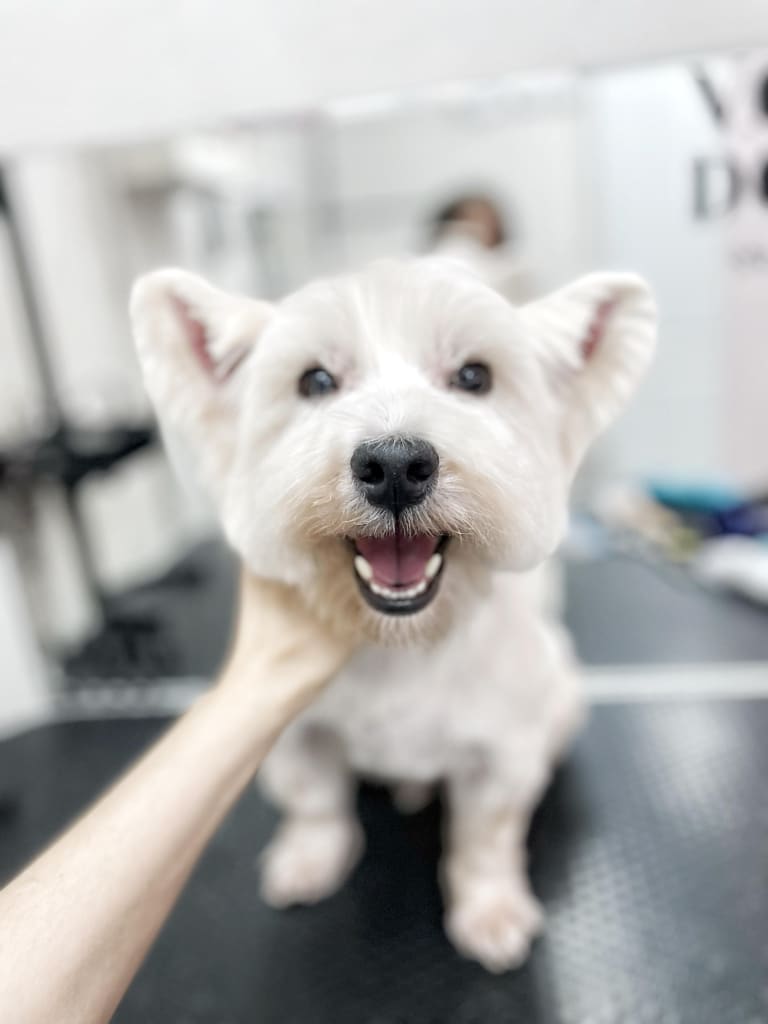
How often should a West Highland White Terrier be trimmed?
Vest trimming is recommended every 2-3 months. This will help to maintain the correct texture of the wool, avoid its shedding and maintain the appearance in accordance with the standards of the breed.
Is it possible to cut a West Highland White Terrier instead of trimming?
A haircut is not a substitute for trimming for a West Highland White Terrier. It can negatively affect the texture of the wool, make it softer and less protective. Trimming allows you to preserve the natural hardness of the wool, which is important for this breed.
How to care for the coat of West Highland White Terrier between trimmings?
Between trimmings, the coat of the West Highland White Terrier should be combed regularly (2-3 times a week) to prevent mats and remove dead hairs. It is also important to bathe the dog about once a month, using shampoos for hard-haired breeds.
How often should the West Highland White Terrier's ears be cleaned?
A Westie's ears should be cleaned once every two weeks, or more often if the dog has excessive earwax build-up. Use special ear lotions to dissolve wax and keep the ear canal clean.
Should the West Highland White Terrier's nails be trimmed and how often?
Yes, it is necessary to trim the claws about once a month to avoid discomfort when walking and to prevent incorrect positioning of the paws. If the claws are too long, they can cause injuries.
Does the West Highland White Terrier need a special diet?
Vestas, like any other breed, need a balanced diet. It is important to provide the dog with high-quality food rich in proteins and vitamins, taking into account its activity level and age. It's also important to avoid products that can cause allergies, as weasels are prone to skin problems.
How often do you need to see a professional groomer?
It is recommended to visit a professional groomer every 2-3 months for trimming and full coat care. In addition, groomers can perform other important procedures such as ear cleaning, claw trimming and hygienic trimming in the genital area.
How much does it cost to trim and groom a West Highland White Terrier?
Prices for vest grooming vary from UAH 1,100 to UAH 2,450, depending on the selected set of services: Hygiene complex, Full complex and DELUXE complex.
Where to cut the vest near?
Our grooming salons are located in the following locations: Pechersk, Solomyanka, Troyeshchyna, Lukyanivka, Poznyaki, Darnytsia, Holosiyvo, Vynogradar, Dorogozhichi, Kryukivshchyna
Gallery of works: PHOTOS of West Highland White Terriers in our salons for dogs
Our Masters
Reviews
Follow us on Instagram!
The West Highland White Terrier, or Westie, is one of the most recognizable breeds in the world thanks to its snow-white coat and lively, playful nature. These little dogs, despite their modest size, have a big personality. Westies are very popular among dog lovers due to their energy, intelligence and loyalty. They are great for family life and are able to bring joy to their owners every day.
Description of the breed and its characteristics
The history of the origin of the West Highland White Terrier
This breed originated in Scotland, where it was used to hunt small game such as rabbits, foxes and badgers. They have ancient roots and their history is closely related to other terriers that developed in the harsh conditions of the Scottish mountains. The white color of the fur was specially bred so that the dogs were easily visible against the background of fields and forests, avoiding the risk of being hit by a hunter’s bullet.
Appearance
The West Highland White Terrier is a compact but sturdy breed with short legs and a well-developed chest. Their body is covered with a thick double coat, where the top layer is rough and tough, and the undercoat is soft and dense. A characteristic feature of the breed is the exclusively white color of the wool, which gives them a cute look. Their expressive dark eyes and erect ears emphasize an inquisitive and lively character. Vesti is known for his courage and independence. They show extraordinary self-confidence and willingness to explore the world around them. These dogs are extremely intelligent and easy to train, although they can be stubborn at times.
The West Highland White Terrier is one of the few breeds that has retained its integrity and has no clear subspecies or variations. All representatives of the breed have the same characteristic features of appearance and temperament, which meet the established standards.
The importance of proper care for the West Highland White Terrier
Why do vests need to be trimmed?
The West Highland White Terrier has a special coat structure that requires a specific approach to care. According to the standards of the breed, the wool of vests must be trimmed, that is, removed manually with the help of special tools. Trimming a vest is a method of removing dead hairs that allows you to preserve the natural texture and density of the coat.
Why is it not recommended to cut this breed?
Grooming the West Highland White Terrier is generally not recommended due to risks to the texture and health of the coat. The main problem with haircuts is that instead of removing dead hairs, as happens with trimming, the hair is simply cut. This causes the top coat to become softer and less dense. In addition, regular trimming of the West Highland can stimulate increased undercoat growth, which creates grooming problems and can lead to shedding, which is highly undesirable for this breed.
Grooming can also have negative consequences for the health of the dog’s skin. When wool loses its natural texture, it becomes less effective in protecting the skin from external factors such as UV rays and humidity, especially during the winter season. This can lead to irritation, dryness of the skin or even the development of dermatological problems.
How to properly trim a West Highland White Terrier
Trimming a West Highland White Terrier is a complex process that requires experience and the use of special tools. The most commonly used tools include trimming scissors, special trimming knives, and finger tweezers. Here is a detailed description of the process:
Preparation:
The dog should be thoroughly combed to remove all coat.
Trimming with a knife:
Using a trimming knife, the groomer removes dead hair, working all over the dog’s body. Special attention is paid to the back, sides and shoulders, where the wool needs trimming the most.
Manual trimming:
Hand trimming is often used for more delicate areas such as the head, neck and paws. The groomer removes hair with fingers or special thimbles, which allows you to achieve a more natural look and provides precise control over the process.
Final processing:
After trimming, the wool is trimmed with scissors, if necessary, to give it an even length and shape. This helps to complete the image and make it more aesthetically appealing.
When and how to cut a West Highland White Terrier
Although trimming is the preferred method of West Highland White Terrier care, there are situations where clipping may be necessary:
When trimming is not possible:
If the dog was regularly clipped instead of trimmed, its coat could become soft and lose its ability to trim. In such cases, a haircut may be the only care option. In addition, if the coat is very shed or the dog has particularly sensitive skin, trimming can be painful, and then clipping will be a more humane solution.
Cosmetic haircut:
In some cases, a haircut can be done for cosmetic purposes to equalize the length of the coat or give it a more well-groomed appearance. This can be useful before exhibitions or photo shoots, where the perfect appearance of the dog is important.
If a haircut is necessary, it is important to follow certain rules and techniques in order to preserve the most natural appearance of the coat and support the health of the skin:
Haircut with scissors:
The main method used to trim the West Highland White Terrier is shearing. Straight and Filing scissors are used to create smooth lines and transitions. Special attention is paid to the area around the head, chest and paws, where it is necessary to preserve the natural volume.
Clipper:
The machine is used carefully, mainly for cutting the undercoat on the stomach, armpits and around the anus, where the hair often falls out. Use attachments of the appropriate length to avoid cutting too short, which can damage the skin or cause irritation.
Grooming West Highland White Terrier
How to properly care for the coat of the West Highland White Terrier at home
The coat of the West Highland White Terrier requires a special approach, because its unique structure involves not only aesthetic care, but also maintaining the health of the skin and hair. To ensure a healthy and beautiful coat, you should follow the following recommendations:
Regular combing:
It is important to comb the coat regularly to avoid the formation of tangles. Use a soft brush made of natural materials for daily care, paying special attention to the area behind the ears, on the chest and belly, where the wool is most often tangled.
Bathing a West Highland White Terrier:
You should bathe the vest no more than once a month to avoid drying out the skin. Use special shampoos for hard-haired breeds that help preserve the texture of the coat and do not overdry the skin. After bathing, be sure to use a conditioner to maintain the elasticity of the wool.
Prevention of dumping:
To prevent shedding, frequent bathing, improper brushing, or the use of inappropriate cosmetics should be avoided. If piles have already formed, be sure to contact a professional groomer to remove them.
Grooming a vest: necessary care procedures
In addition to regular trimming and hair care, the West Highland White Terrier needs a number of additional procedures that will help maintain its health and appearance at the highest level.
Claw trimming
Regular trimming of the claws is an important procedure for the West Highland White Terrier. Claws that are too long can cause discomfort when walking, cause misalignment of paws and even lead to injuries. Claws should be trimmed about once a month or more often if they grow faster. It is important to use special nail scissors to avoid cracks and splits. You need to trim carefully, avoiding damage to the blood vessel that is inside the claw (it is called “pulp”).
Ear cleaning
The ears of the West Highland White Terrier also require regular care, as this breed is prone to earwax accumulation and the development of infections. Ear cleaning should be done about once every two weeks, or more often if there is a tendency for excessive wax formation. To do this, use special ear drops or lotions that help dissolve the wax and keep the ear canal clean. After applying the product, carefully wipe the auricle with a clean cotton ball or napkin. Do not use cotton buds to avoid damaging the ear canal.
Wiping the eyes
Westies have sensitive eyes that require regular care. In the West Highland White Terrier, tear secretion can accumulate, which leaves marks on the fur around the eyes. This can cause irritation and even infection. To prevent this, you should regularly wipe your eyes with a tissue soaked in warm water or a special eye care product. This should be done carefully, avoiding getting the product into the eye.
Hygienic haircut in the genital area
Hygienic haircut is an important component of West Highland White Terrier care. Trimming the genital area helps maintain cleanliness and reduces the risk of infection, especially in young girls. Removing excess fur in this area helps to avoid the accumulation of dirt and bacteria that can cause skin irritation or inflammation. This procedure should be performed regularly, depending on the speed of hair growth. It is important to entrust this work to a professional groomer who has experience working with sensitive areas and will be able to perform a haircut neatly and safely.
Contacts
Kiev, Pechersk district, M. Mikhnovsky Boulevard (Friendship of Nations), 27
Kiev, Pechersk district, Lesya Ukrainka Boulevard, 14
Kiev, Solomyanka district, V. Lobanovsky Avenue, 6a
Kiev, Desniansky district, Red Kalina (Mayakovsky) Avenue, 68a
Kiev, Shevchenko district, Sholudenka Street, 14
Kiev, Darnytsky district, Knyazhy Zaton Street, 2/30
Kiev, Dnipro district, I. Kotlyarevsky (Work) Boulevard, 7
Kiev, Holosiivskyi district, 4 Seasons Residential Complex, Maksymovycha Street, 3d
Kyiv, Obolonskyi District, V. Ivasiuka Avenue, 6B (building 2)
Kiev, Shevchenkivskyi district, Shchusev Street, 4
Shop 10:00-21:00
Hotel 24/7
European Street, 2a (Eurocity Residential Complex, near Vyshneve town)
Kiev, Darnytskyi district, st. Knyazhiy Zaton, 11
